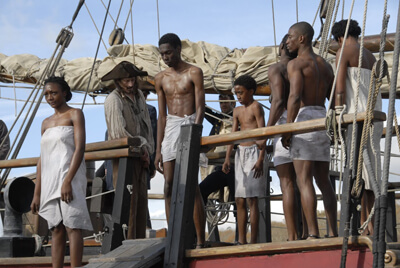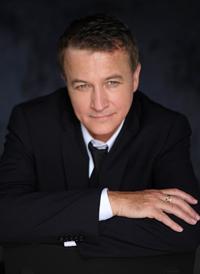
DAVID ADAMS speaks with Peter Cousens, director of new film Freedom…
The story of the Underground Railroad and the impact it had on slavery in the United States during the 1800s is one that’s reasonably well-known in the US and Canada. Not so much in Australia.
A new film sets out to change that, showing the important role “ordinary people” had in confronting slavery then in a bid to inspire people to join with those who are still doing so today.
Directed by Australian Peter Cousens, Freedom follows a family of slaves who, in the 1850s, look to escape from their owners on a Virginian plantation in the southern US. They’re helped along the way by members of the secret network of people who form the backbone of the Underground Railroad, which used secret routes and safe houses to help slaves reach a new life in Canada.
|
|
|
FREEDOM: (top) – The Woodward family escape via the Underground Railroad; and bottom, slaves aboard John Newton’s ship. “We’ve been inspired by various stories which make up the Underground Railroad story and we’ve applied them to the film…(I)t was just a loose collection of people who had similar ideas. Some of these people were Quakers, they were African-Americans…some were actors, they were business people, farmers, ordinary people who secretly risked their lives. It was incredibly dangerous…”– Peter Cousens, director of Freedom |
One of the slaves in the story owns a Bible which was once the property of a slave ship captain turned abolitionist John Newton and it’s through that link that, alongside the journey of the escaping slaves, the story of how Newton came to write the song Amazing Grace is told.
The film stars Academy Award winner Cuba Gooding, Jr as Samuel Woodward – a young man who is filled with anger and mistrust but who, thanks to his grandmother’s gentle encouragement, embarks on a journey towards faith and forgiveness. Others in the film include US film and TV veteran William Sadler, who plays the slave hunter paid to track them down, Sharon Leal who plays Woodward’s wife Vanessa, Bernard Forcher, who plays John Newton and Jubilant Sykes, who plays the singing slave Ozias.
There are also a number of Australians – Tony Sheldon, Anna Sims and Cousens’ daughter Daisy (Cousens himself makes a cameo) – while the cinematography is the work of Oscar-nominated American Dean Cundey, whose previous credits include Apollo 13, the Back to the Future franchise and Jurassic Park.
It’s the first time Cousens, a stalwart of Australian TV and, in particular, musical theatre where his roles have included The Phantom, and Marius in Les Miserables, has ventured into film direction – a role which he describes as the “best job in the world”. He says the idea for the film came out of discussions he had with a friend – and later the film’s primary investor – to “have a voice in the community” which resulted in them starting to “dream about this idea of making a film that was powerful and uplifting and was helpful”.
Armed with the concept and a script, Cousens headed to the US and “with a bit of chutzpah and a bit of chat and a lot of confidence, we sort of ploughed into it…”. “The whole world of independent film-making kind of opened up for us,” he says.
The film’s story features some real characters – including Underground Railroad identity and Quaker, Thomas Garrett (played by Michael Goodwin), and early civil rights activist Frederick Douglass (played by Byron Utley) as well as Newton – with the rest “inspired by real events”.
“We’ve been inspired by various stories which make up the Underground Railroad story and we’ve applied them to the film…” says Cousens. “It wasn’t really an organisation, it was just a loose collection of people who had similar ideas. Some of these people were Quakers, they were African-Americans…some were actors, they were business people, farmers, ordinary people who secretly risked their lives. It was incredibly dangerous, you could be hung on the spot for doing this, it was totally against the law.”
It’s been estimated that more than 100,000 slaves were smuggled out of the US into Canada in the mid-1800s.
One of the key things that initially attracted Cousens to the script was that it “had all this music in it”. “The idea of combining music and quite a serious story was intriguing, particularly on film,” he says.
The musical element centres on the creation of Newton’s Amazing Grace. “Amazing Grace – the idea of that song representing or expressing this notion of freedom, of love, of grace – was at the heart of the film and other music plays into that as the film unfolds. There are 11 songs that are actually sung in the film but I wouldn’t call it a musical.”
Cousens likens the style of the film to that of the George Clooney movie of the early Noughties, O Brother, Where Art Thou?
“This is similar in that (the music) tells the story, or at least from an emotional level, it tells the story,” he says. “The idea of singing is a very interesting metaphor for freedom in terms of self-expression. If you ask any singer – a professional singer, people who sing a lot – they would tell you that the notion of singing is extremely releasing and you feel very free, emotionally and psychologically, when you sing. That doesn’t necessarily equate to political freedom but in terms of your personal rights and the way that you express yourself and what you spiritually believe in, etcetera, it’s an interesting notion to use singing as a metaphor for that.”
Faith is also obviously a key aspect of the film. “Most of these characters because of the times, they’re driven by their faith,” notes Cousens. “Their Christian beliefs are very present, particular amongst the African-Americans, particularly amongst (those in) the world of John Newton.”
The director, who says he was brought up as an “old-style Anglican”, says making the film certainly impacted his own faith.
|
“Making the film was filled with moments of, I think, God’s intervention…I’ve seen God at work in that situation and it’s increased my faith. It’s been kind of life-changing, in a way, for me in that respect…”– Peter Cousens |
“Making the film was filled with moments of, I think, God’s intervention…” he says. “I’ve seen God at work in that situation and it’s increased my faith. It’s been kind of life-changing, in a way, for me in that respect – what I learnt and what I saw and what we were able to achieve when it seemed impossible to do. Those sorts of things happened constantly.”
Cousens says he’s also “enormously grateful” for the support he received from Christians while making the film. “I’m sure when I look back at it in years to come, I’ll see it very much as a turning point (in my life)…”
And while he expects many of those who come to watch the film will have a faith, he says Freedom is “the kind of film which Christians can easily take their secular friends to and not feel like they’re sermonising”.
“It’s a rollicking good tale, beautifully told and beautifully filmed, and, yes, you can have a discussion about Christianity if you wanted to or you can just discuss the history of slavery or you can discuss the music or you can discuss John Newton. There’s a whole range of things that people can get from the film – there are many rewards on different levels.”
He hopes those watching the film will see the extraordinary courage of those involved in the Underground Railroad and be encouraged into action today.
“This concept of an Underground Railroad is very present today with the range of organisations and people working in the field at the coal-face trying to save various people who have been enslaved.”
“There are organisations like Destiny Rescue and The Freedom Project…They are the modern Underground Railroad, if you like, they’re the people out in the field risking their lives and sacrificing their lives to try and save these people; to bring them to freedom.”
Freedom opens nationally in Australia on 21st August.







